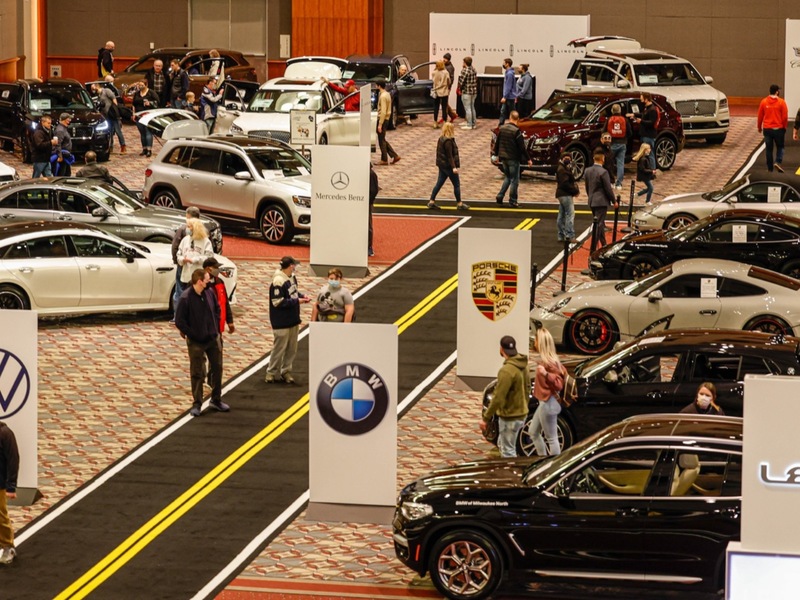This content is presented in partnership with ADAMM.
These days, a car is available with an engine that produces 797 hp. That’s more than many Indy cars and a far cry from the 50 hp cranked out by the Volkswagen bus your hippie grandparents drove when they went out to look for America.
If your hippie grandparents’ van had an eight-track tape player, they might have listened to The Byrds singing about how there’s a time (and place) for "every purpose under heaven." And so it goes with horsepower. Just because you can get 797 horses doesn’t mean you should.
Automakers offer engines with varying horsepower ratings on almost every type of vehicle available today – from the smallest crossovers to the biggest pickups and SUVs. Whether you should move up from a base engine to one with more get-up-and-go depends on how you answer few questions about how you plan to use the vehicle and how much you want to spend.
Do you need horsepower or torque?
The more horsepower a vehicle has, the faster it can go. Torque, on the other hand, is what you need to get a vehicle going from a stop. So if you want to breeze by other cars on the freeway, you need horsepower. If you want to tow a boat, torque is your friend.
"More horsepower does not automatically mean more towing capacity," says Paul Miller, fleet and commercial director for the Russ Darrow Automotive Group of Milwaukee. "The deciding factors are not only the weight of the load, but also how often and how far you’ll be towing it, and over what kind of terrain."
Torque, or twisting force, is what makes it possible for the vehicle to move at low speeds, and Miller says that factors like gear and axle ratios matter more than raw power. Some customers know that, some don’t, he says, but in either case, it’s a good idea to let a sales pro help you make sure your vehicle is equipped to do what you want it to do.
How much do you want to spend?
Bob Viall, sales and leasing consultant for Boucher Chevrolet in Waukesha, says that some people really, really, really like the feeling of power that a high-horsepower engine delivers. But if you plan on using a vehicle – whether a sedan, minivan, pickup or SUV – mainly to drop kids off at school, commute to work and go to the grocery store, choosing a V6 instead of a four-cylinder engine, a V8 instead of a V6 or even a bigger V8 will not only add 20 percent or more to the sticker price, but will jack up fuel costs. A quick check of EPA ratings indicates that stepping up just one level from, say 290 hp to 375, can reduce mileage by two to six miles-per-gallon.
"When we talk to people about this," Darrow’s Miller says, "we’re not trying to talk them out of getting a certain vehicle. We’re telling them that they don’t have to go way out of their way to get what they need. Because of the materials the manufacturers are using, vehicles are lighter than a few years ago, so you might not need as much horsepower as you used to."
This doesn’t just apply to trucks. Looking up a database of cars sold in the area over the past three months, he found that customers favored 2019 Dodge Challengers with the base 305-hp V6 by nearly two-to-one over V8s with much more verve.
Noting that the V6 costs $6,500 less than the smallest V8, he says, the difference has to be price – or the available four-wheel drive on the V6’s. US News agrees, saying in its review that "though it’s the baby of the Challenger lineup, the V6 is still plenty satisfying for everyday driving."
More food for thought
- Says Autotrader.com reviewer Doug DeMuro, "Think about whether you want to fork over the extra cost up front or spend the extra money at the pump to get better acceleration and performance. If you don’t mind paying for it, a big engine can be a blast. But if you're on a tight budget, skip it and go with a more efficient powertrain."
- According to Daniel E. Patrick of How Stuff Works, diesel engines generate more torque than gas engines. To illustrate, he compares a 6.7-liter, 350-hp turbo diesel that creates 650 pound-feet of torque and a 5.7-liter gas-powered V8 rated at 383 hp and 400 pound-feet. While the trucks have similar towing capacities — 15,650 pounds for the gas and 16,350 for the diesel — "the low-end power means the diesel engine will have an easier time."
- A blogger known as The Car Crash Detective recommends going with lower-horsepower vehicles if they’ll be used by teen drivers. "High horsepower is seductive," he says, "and speeding is implicated in roughly one out of every three fatal crashes." He also notes that because teens are more likely to be involved in fatal crashes per mile traveled than any other group, it’s best not to encourage risky behavior like jackrabbit starts, street racing and making risky lane changes.







